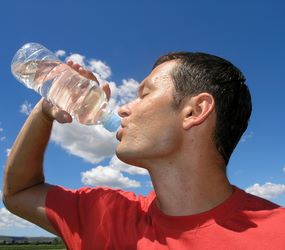Quenching Dehydration
 When the sweating stops and dizziness, weakness and nausea set in, it could very well signal dehydration.
When the sweating stops and dizziness, weakness and nausea set in, it could very well signal dehydration.
Derrick takes a water break every few minutes during practice. Dehydration has tackled him on and off the field before, and he remembers the pain all too well. “I was cramping from my neck all the way down to my foot.”
To head off dehydration, these football players are weighed before and after practice, and then again the next day to ensure they’re maintaining enough fluids. One pound of weight loss equals one pint of water loss.
When drinking fluids isn’t enough to maintain the weight, it may become necessary to replace the loss intravenously, under the supervision of a doctor.
That’s the only way that’s acceptable if it’s a physician who knows the athlete, knows the set of circumstances and a sterile environment.
During the IV, blood pressure must be monitored and a hospital should be nearby in case the athlete does not rebound quickly.
In any sport, pushing water and other fluids all day, everyday is good preventive medicine. Remember alcohol and soda don’t help!
If you get dehydrated, dizzy or nauseous, stop your activity immediately, get in the shade, and sip a drink slowly. If you’re not feeling better within a half hour, it’s time for the emergency room.
Experts say water is as good as sports drinks when it comes to keeping the body cool, but sports drinks add important substances, like electrolytes, back into the body.

